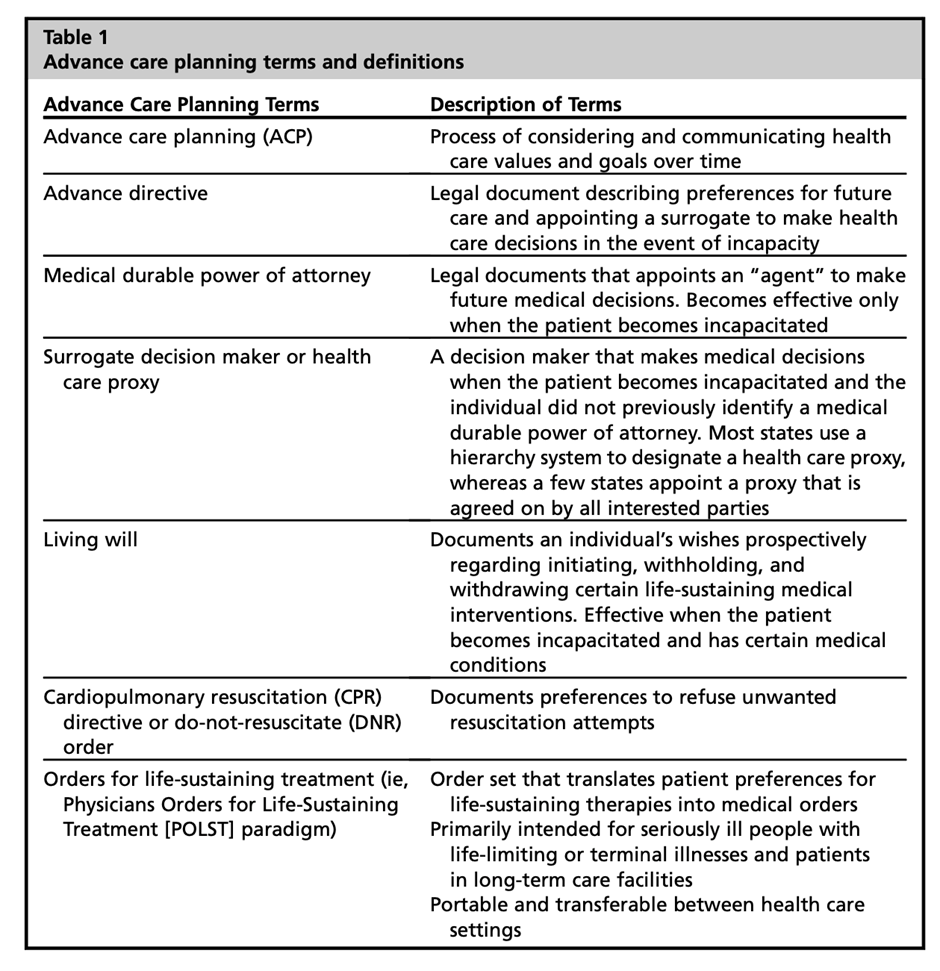
.
May 13th, 2022
.
Add this to your list of topics for discussion at future visits: Advance Care Planning
For a few different reasons it can be an intimidating topic. With more information and knowledge of a free resource, I hope to both highlight the importance of advance care planning and make this topic feel more approachable.
.
Advance care planning is the process of planning for future medical care with the goal of helping people receive care that is aligned with their preferences. It supports adults at any age or stage in health to identify personal values, goals and preferences that can be translated into medical care plans. The experts in the field like to point out that it is an ongoing process involving multiple discussions over time as health issues and goals evolve. It works best when the conversation starts with values/goals/preferences and then those are aligned with treatment options/recommendations. Our job as your primary care providers is to have these conversations with you and document them so that more is known about your preferences if there comes a time when you’re not well enough to communicate for yourself. Advance care planning can increase peace of mind and decrease stress.
Advance care planning is the process of planning for future medical care with the goal of helping people receive care that is aligned with their preferences. It supports adults at any age or stage in health to identify personal values, goals and preferences that can be translated into medical care plans. The experts in the field like to point out that it is an ongoing process involving multiple discussions over time as health issues and goals evolve. It works best when the conversation starts with values/goals/preferences and then those are aligned with treatment options/recommendations. Our job as your primary care providers is to have these conversations with you and document them so that more is known about your preferences if there comes a time when you’re not well enough to communicate for yourself. Advance care planning can increase peace of mind and decrease stress.
.
Advance care planning is the umbrella term under which many things fall. A key feature of advance care planning includes completion of an advance directive, a legal document in which a surrogate decision maker is appointed and preferences for future medical care can be expressed. A physician is not needed to complete an advance directive. Having said that, we are here to help with the conversations that inform the decisions expressed in that document. I have included a table of definitions below because I think the various terms thrown around are part of what makes the topic confusing and intimidating. One important distinction is that advance care planning is much more than a one-time documentation of advance directives.
Advance care planning is the umbrella term under which many things fall. A key feature of advance care planning includes completion of an advance directive, a legal document in which a surrogate decision maker is appointed and preferences for future medical care can be expressed. A physician is not needed to complete an advance directive. Having said that, we are here to help with the conversations that inform the decisions expressed in that document. I have included a table of definitions below because I think the various terms thrown around are part of what makes the topic confusing and intimidating. One important distinction is that advance care planning is much more than a one-time documentation of advance directives.
.
One of the most important aspects of advance care planning is identifying someone you trust to help make medical decisions for you if there ever came a time when you couldn’t speak for yourself, communicating with that person and completing legal documentation that they are your surrogate decision maker. There is an automatic order of surrogate decision makers if nothing is documented and the order varies by state. In Washington state the order can be found here.
One of the most important aspects of advance care planning is identifying someone you trust to help make medical decisions for you if there ever came a time when you couldn’t speak for yourself, communicating with that person and completing legal documentation that they are your surrogate decision maker. There is an automatic order of surrogate decision makers if nothing is documented and the order varies by state. In Washington state the order can be found here.
.
Below is a link to a helpful free resource that doctors who specialize in advance care planning have highly recommended. It takes you through 5 steps – choosing a medical decision maker, deciding what matters most in life, choosing flexibility for your decision maker, telling others about your wishes, and asking doctors the right questions – and allows you to print out a legal form “The PREPARE Advance Directive” to share with others.
Below is a link to a helpful free resource that doctors who specialize in advance care planning have highly recommended. It takes you through 5 steps – choosing a medical decision maker, deciding what matters most in life, choosing flexibility for your decision maker, telling others about your wishes, and asking doctors the right questions – and allows you to print out a legal form “The PREPARE Advance Directive” to share with others.
.
.
For those hesitant about advance care planning I will ask you the same question an expert in the field Dr. Rebecca Sudore posed in an interview on the topic: “What if it’s easier than you think it’s going to be?” I like this question as it relates to broaching the topic of advance care planning – and many other sources of worry in life – and it has inspired me to bring this topic up with all of you.
For those hesitant about advance care planning I will ask you the same question an expert in the field Dr. Rebecca Sudore posed in an interview on the topic: “What if it’s easier than you think it’s going to be?” I like this question as it relates to broaching the topic of advance care planning – and many other sources of worry in life – and it has inspired me to bring this topic up with all of you.
.
 .
.
Source(s):
Lum H, Sudore R, Bekelman D. Advance Care Planning in the Elderly. The Medical clinics of North America 2015.
 .
.Source(s):
Lum H, Sudore R, Bekelman D. Advance Care Planning in the Elderly. The Medical clinics of North America 2015.
